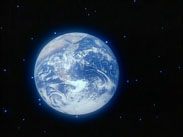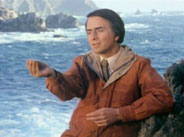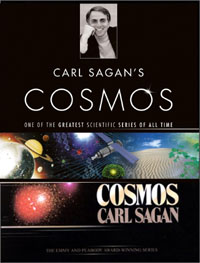|
I remember how much time and energy was spent in the late 1970's and early 1980's
to bring this much focus and ridicule upon the nuclear arms race, how strong the
message became in our schools and in our media, and I think the Human race turned an
important page in our history back then, when our corporate and political leaders
HAD to change their tunes on this matter or risk appearing to be idiots
and thus lose their power en masse.
I now suspect that "Cosmos" had a significant role in making that shift happen.
Even if I didn't see Cosmos back then, I sure saw the ripples spreading outward
in society. This was an important issue to flog at that time. So, even if
it makes dull viewing today, I still think it needed to be what it was for the time.
And there is a lot of screen time devoted to a dark and depressing take on Humanity's
chances for peace and survival in the first half of this episode. Though it still
has hopeful sparks here and there within it, it is a bit of a test of endurance
to sit through this dark side - and thus I don't think episode 13 is one that I will
want to re-watch too often.
Thankfully, the episode makes a refreshing shift about 35 minutes in, to focus
on Humanity's achievements in climbing this far up the evolutionary ladder,
beating the odds throughout the billions of years since the universe began.
The episode becomes full of hope for the brilliant Human achievements yet to come
should we put our minds to the challenge. It's quite reminiscent of
Tom Baker's oft-mentioned speech about Humanity from
"The Ark in Space" (story no. 76) which many
Doctor Who fans love to reference.
And this is to an extent Beethoven's episode, as his 7th symphony is
used to back both Humanity's darkest hour and its glorious triumphs and potentials.
But here again, it's just a few well-chosen words from Sagan for sparse narration,
while a montage of re-run clips from the rest of the series takes up most of the running
time. It's all very nicely upbeat, curing the depression that he may have induced
earlier, but there's not much actual information content here. Episode 13 takes
aim more at the heart than the head, and hits its target, without being particularly
interesting in the process.
|
"The whole aim of practical politics is to keep the populace alarmed
(and hence clamorous to be led to safety)
by menacing it with an endless series of hobgoblins,
all of them imaginary."
|
|
-Henry Louis Mencken (1880-1956)
|
This quote by journalist Henry Mencken
actually has nice resonance with this episode for several reasons.
One reason is that the so-called necessity of the nuclear arms race
was one of those "hobgoblins" that was slotted into this political formula.
If this "cause" has been shamed out of existence, has the formula gone with it?
It seems instead the formula is merely always ready to switch to the next "hobgoblin"
and carry on as before, finding new ways to take advantage of the populace.
It is perhaps worth noting that the craftiest politicians will just as easily employ
real hobgoblins to their ends as well as imaginary ones, adapting as necessary to whatever
they believe the populace will best respond to.
I bring this up because episode 13 also makes a case, as episode 4 has done before it,
to be aware of our environment and to take care of the Earth, which is a noble cause.
However, as the Human species grows up, and becomes less afraid of our neighbours on
the Earth, and many of the old political scare tactics based on national wars no longer work,
the more crafty of our power hungry leaders are reaching into previously untapped subject
matter in order to market themselves as society's solutions. In essence, some of them
latch onto the environmental bandwagon, and it may require us to continue to be vigilant
enough to tell who is actually going to help create a positive impact on our relationship
with the environment and who is merely just out to use the environment as the next hobgoblin,
the next excuse to pillage the population, and get the populace to give up their power.
I would suggest one of the great cornerstones to telling this difference rests
upon the details of any offered solution. Firstly, are there any details? Insist upon them,
from anyone who displays an environmental bent. Because, if they really can't say much other
than that they're working to shift X amount of money from point A to point B, this is all the
hallmarks of a giant scam. This bears repeating:
Shifting money is typically a sign of a scam.
If they're going to initiate a study of the problem - well,
they'll spend money, collect data, and it'll probably end there.
The world is already full of environmental solutions and alternate technology
that remain unknown, unused, and unavailable to the mass market. I want to see those
highlighted and brought forth. I want to see them advertised and brought to market.
At any rate, Cosmos episode 13 pushes the environmental issue up front, which is good,
but it falls short of warning the viewers on how to recognize when politics and
corporate economy adapt and usurp this issue as their next big hobgoblin,
to replace war-bent threats with environmental threats and keep us living subserviently
in a state of lack, forking money into a pot that will never do any real thing for
the environment. To be fair, environmental concern was not the misused vehicle
of political control back when Cosmos was first made, not to the extent that the
danger of this misuse exists today. However, other excuses for excessive government
control have always been with us....
|
"So far as I know,
I don't know of any case in history
in which monopolies have been able to maintain themselves
for very long without having government assistance
directly come in on their side."
|
~Economist Milton Friedman,
in his series "Free to Choose",
episode 2, 47 minutes in.
|
This becomes an important consideration if we blame big business
for crimes against the environment, and then expect government
to bring big business under control. Government regulations,
no matter their stated intentions, often wind up having the effect
that certain big businesses (the ones that can afford high-paid lawyers)
are the only entities that can appear to meet those regulations
and continue to do business. In other words,
big business may actually like the regulations
because the regulations can be used to weed out their smaller-budget
competition. If it's a carbon-tax, they simply pass it on to the consumer
who HAS to pay because he doesn't have the alternative to choose
that company's eliminated competitors. The alternative environmental options
must already be on a truly open market before fines and penalties
can make a positive impact. And to another point, do we really want
government to be making these decisions for us? Would they choose
based on what's best for the environment, or cater to those interests
that can keep them in power?
|
"I am in favor of the laws which make agreements
in restraint of trade illegal.
Most of the rest of the anti-trust apparatus has promoted monopoly
instead of hindered monopoly.
If you look at where there are monopolistic elements
in the world and in the United States,
including the multi-nationals you want to refer to,
in almost every case that monopoly
derives from a special grant by government.
And therefore, the problem is not how does government enforce competition,
[it's] how do you keep government from setting up monopolies?
That's the real problem, if you look at the real world
and not at the preamble of the language
of anti-trust measures and similar laws."
|
~Economist Milton Friedman,
in his series "Free to Choose",
episode 2, 46 minutes in.
|
Will we see beautiful and eloquent environmentally-friendly preambles
on the front of laws and regulations that further enhance the monopoly
of oil companies and current energy corporations, while a carbon tax
increases the lining on the pockets of their CEO's, shareholders, and
friends in government? I think we'll have to be far more diligent
and skeptical in order to be effective at making real progress
on environmental issues.
The Ted Turner Interview
What was once touted as the "14th episode" of Cosmos is a 45-minute interview
of Carl Sagan conducted by media mogul Ted Turner himself. Although Sagan is able to
get into his usual passionate and eloquent gear at many points during this, it really
is a much more dry and clumsy piece of television by comparison, and doesn't really
come up to the standard worthy of an additional "Cosmos" episode. At best, it is an
odd bonus feature of the VHS release and Turner's syndication broadcasts, one which
didn't merit a place on the DVD box set.
For content, this interview is mostly re-hashing the sentiments of episode 13
and flogging the dead horse some more, with a bit more detail in it - and in 1989
it seems that was still a worthwhile exercise. To its credit, it does tackle the
challenge of asking the hard questions - if someone says they're an environmentalist,
ask them in what way are they an environmentalist. Sagan encourages the audience to probe
deeper, which is great. His example says that lip service to an issue isn't enough,
and he wants to see a budgetary commitment. Perhaps this is a plateau he might be comfortable
with, considering how NASA felt underfunded in the 1970's and 1980's - if only NASA had
got what it deserved from U.S. Federal budgets, that money would have flowed towards
projects that Sagan himself and his colleagues could use. I'm sure he trusts himself
and his colleagues to produce worthwhile results. Perhaps
the rest of us might also conclude that NASA delivers well,
at least until we learn what secret activities or falsehoods
NASA may have been spending taxpayer money on.
But, particularly on environmental
concerns, I don't think the rest of us should be satisfied with financial and budgetary
commitments - we should always be ready to ask where the money is going and what it will produce.
And we shouldn't stop asking until we get to the point where our lives and habits are impacted,
where we can see ourselves being sustained and thriving in abundance in harmony with the
environment. We should never be satisfied at the thought that we are finally going to
"buy" our way into environmental harmony. That can too easily be usurped
by corporate and political scammers to line their pockets with money.
We really have to focus on the technology employed
in our own day to day habits... and when we are successful there, perhaps the solutions
have far less to do with governments or corporations, but with our individual choices.
Sagan mentions that people could plant trees to help the environment - well that only
really resonates if you do it in an area that Humans unfairly clear-cut. Remember,
trees have an entire reproductory life cycle themselves. Living in the midst of a forest
as I do, planting more trees here is quite silly - more new trees sprout each year than can
be supported by the amount of space and sunlight available. Context is important,
and often left out of these suggestions. This interview bounces rather clumsily between
ideas bad and good, and even some of the more benign ones have later been usurped by
corporate, profit-oriented scams. So the interview ends up being quite dense and muddled,
with Turner's lack of good listening skills becoming evident in a few places where he
talks over Sagan too much, and a few too obvious edits cut away from moments where
tensions were beginning to rise between the two participants. In the end,
the interview is a bit of a chore to sit through in its entirety. For those
wondering why it isn't on the DVD sets, don't be too saddened at its loss.
Episode 13 proper spends enough time covering this issue for today's audience,
with neither that nor the Turner interview having enough detail to truly
put the hobgoblin formula out of business.
"Cosmos" Wrap-Up
Well, though the ending of this 13-episode series from 1980 worked fair enough
for its time, but could potentially lead its audience into a danger area today,
I have to say that I really like this 1980 series as a whole.
A few areas seem to have quite large flaws, but these trouble spots are
really overwhelmed by the fact that "Cosmos" offers SO MUCH to its viewers
and listeners over the 13-episode span, and most of it is so good and awe-inspiring,
both in terms of content and in the style of presentation and production.
This truly is a landmark series, to which the more modern astronomy documentaries
owe a great deal of gratitude and respect. And as future historians look back,
it will no doubt remain well-regarded as an important artefact of our society's
art and culture, which engages the masses in the processes of the advancement
of science and space exploration. Everyone on the planet should see Cosmos
at least once, after which I dare them to not want to see it again at some
point, or indeed out of pure enjoyment many times over throughout their lifetimes.
|










